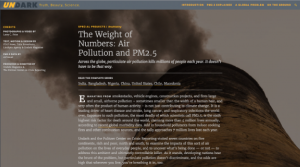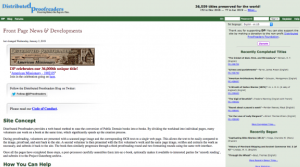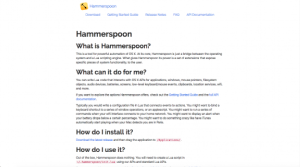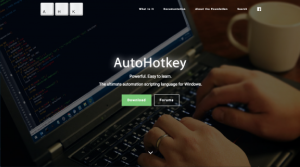General Interest
Back to Top
|
 |
|
Undark: Breathtaking
|
Science |
|
Particulate air pollution is a serious human health hazard in locations around the world, connected to nearly seven million deaths each year. Recently, the digital science magazine Undark (featured in the 2017 Best of the Scout Report) published Breathtaking, a special series of articles focused on a specific classification of particulate pollution, PM2.5. Here, readers are taken on a journey that "visit[s] seven countries on five continents, rich and poor, north and south, to examine the impacts of this sort of air pollution on the lives of everyday people" and also looks at whether and how this deadly problem is being addressed. Locations include California's San Joaquin Valley, where one in six children are estimated to have asthma due to the region's recurring air pollution, and Macedonia, whose coal-based electricity and political difficulties contribute to its "reputation for having some of the worst annual average air pollution in Europe." Accompanied by many highly visual photographs, videos, and interactive graphics, Breathtaking provides an informative and engaging exploration of worldwide particulate pollution. This series was produced jointly by Undark and the Pulitzer Center on Crisis Reporting. [JDC] |
|





|
|
 |
|
 |
|
Debating Matters
|
Social studies |
|
Educators seeking to foster their students' ability to form rigorous, well-researched, reasoned arguments may want to check out Debating Matters. Launched in 2003 by the UK-based organization Academy of Ideas, Debating Matters is an annual competition for 6th-form students (equivalent to US 12th grade). However, the competition's website contains many resources that readers outside the UK can also benefit from, including a library of more than eighty well-developed, in-depth topic guides "covering debates relating to big questions about science and experimentation, liberty and the law, arts and culture, health and medicine, politics, the media and more." Recently added and updated topics include the repatriation of museum artifacts, autonomous vehicles, and artificial intelligence. While the topic guides are designed for debaters preparing for competition, educators may also adapt their contents for classroom use. Teachers interested in leading or starting a debate organization at their school should visit the resource hub. Here, readers will find two resource packs created to help teachers start a debate club or organize a Debating Matters-style competition, as well as several case studies describing teachers' experiences in this area and videos showcasing how Debating Matters events work. [JDC] |
|





|
|
 |
|
 |
|
The Quest for Sourdough
|
Science |
|
Puratos, an international company located in Belgium that supplies products for bakeries, patisseries, and chocolate manufacturers, also maintains a library of sourdough strains. Similar to a seed library, the Puratos Sourdough Library currently catalogs 1,430 sourdough varieties, which can be browsed via the Quest for Sourdough website. The library accepts two types of submissions from sourdough aficionados: recipes and actual samples of sourdough starter. Samples are analyzed for microorganisms in labs at the Uni Bolzano and Bari in Italy. After analysis, the microorganisms are then stored in a freezer at -80C/-112F to preserve their biodiversity for the future, while the sourdoughs are kept in optimal condition in refrigerators at 4C/39F. Each sample is refreshed every two months with the flour with which it was originally made. In addition to the scientific side, the website includes a blog with stories and lots of recipes, such as Ione's sourdough waffles (from Alaska) or Sourdough donuts. Belgium is not typically known for its sourdough baked goods and, in fact, consulting the map of location origins of the sourdoughs in the library shows that the majority have been collected from the United States. [DS] |
|





|
|














